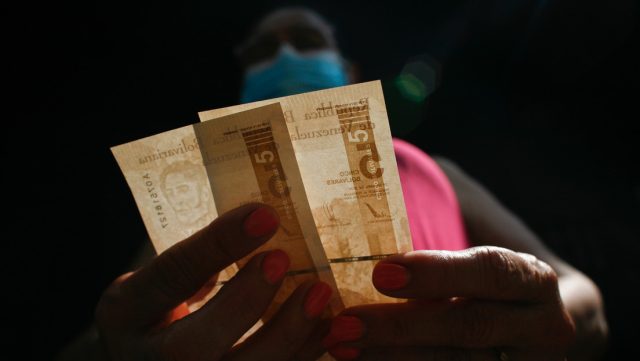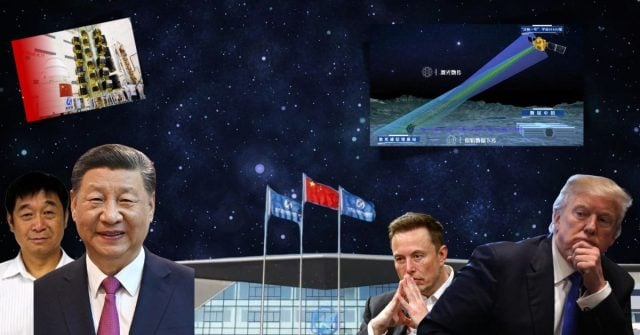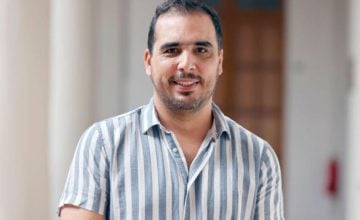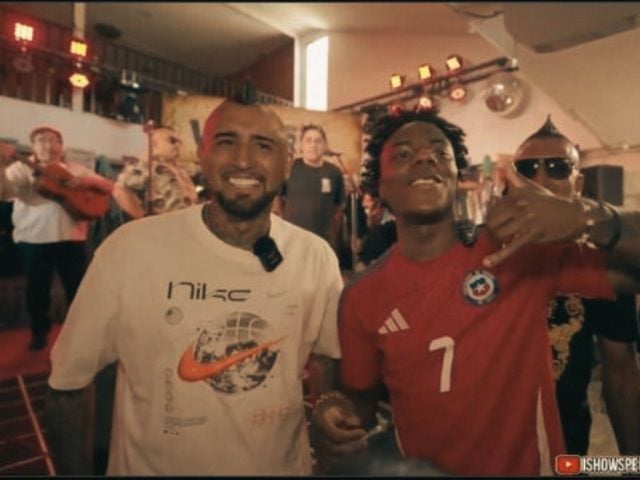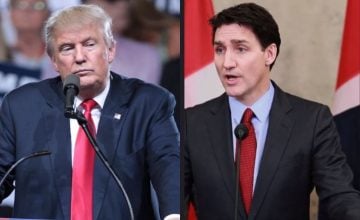In recent weeks, the Venezuelan economy is showing signs of a behavior that until recently seemed unusual: the daily valuation of the dollar against the bolivar is no longer a concern, much less rushing out to buy foreign currency.
Listening to the daily rise in the dollar as a topic of conversation or seeing WhatsApp statuses with messages of buying and selling dollars has disappeared from the daily ‘routine’. Nor is it a matter of urgency to check twice a day the price of the so-called «parallel dollar», which until last year increased its value exponentially against the bolivar and was used as the main reference in the market.
Thus, the economic maelstrom that Venezuela showed between 2016 and mid-2021, with uncontrolled hyperinflation —unprecedented— that destroyed the purchasing power of the population, its quality of life and left the bolivar as a currency that no one wanted to have in their hands, now shows another dynamic, informs RT.
In this scenario, there are now commercial premises that mark their prices only in bolivars, when before —in the midst of the hyperinflationary crisis— their shelves only showed labels with references in dollars, which were used to calculate the final payment of a product according to the exchange rate. dictated by the parallel market, which could change depending on the day and the hour of the day.
The new situation, although it maintains foreign currency transactions —mostly with dollars in cash, crypto assets and foreign digital payment methods—, also shows a marked preference for the use of the bolivar through electronic payment methods and even bills that are kept in circulation with the new monetary cone.
At the beginning of the week, the Venezuelan vice president and also the Minister of Economy and Finance, Delcy Rodríguez, indicated —during the presentation of the report and account before parliament— that between 2021 and 2022, the demand for the bolivar has shown a recovery and has revalued itself by at least 6% against the dollar.
How did the bolivar recover itself?
The senior official explained that the current economic dynamics is the product of a series of measures applied by the government, since August 2018, through the «Recovery, Growth and Prosperity Plan» presented to the country by President Nicolás Maduro.
From that moment – Rodríguez pointed out – different actions have been carried out that began with the repeal of the Illicit Exchange Law, «to facilitate the entry of foreign currency», which allowed the free circulation of the dollar and other currencies «in all the commercial circuits of Venezuela”.
Other important measures were the substitution of price controls for a scheme agreed upon with the productive sectors; the execution of tax and tariff reforms; and the creation of a new foreign exchange market in which various economic actors participate, which has made it possible to fix the value of foreign currency with respect to the bolívar in the legal market, and not the so-called parallel dollar that was previously imposed.
Rodríguez also highlighted the approval of the Anti-Blockade Law, created to attract foreign investment «safely» in the face of sanctions imposed by the US, the European Union and their allied governments; and the institutionalization of dialogues with the private sector through the National Economy Council, which has been «essential» for «the progressive recovery of the national production».
Another correct policy – indicated the vice president – is the public procurement program, which privileges the acquisition of products made in Venezuela over imported ones, which has had a positive impact on local production in the different sectors.
And, although current economic policies seek to break with oil rentism due to the «deformations» it generates against the economy, Rodríguez explained, the current situation also includes the resurgence of the industry that raised production in December 2021 to more than 1 million barrels per day, with the goal of reaching 2 million by 2022.
Impact of the digital bolivar
Rodríguez commented that a key point was the implementation of the Monetary Recovery Program, which included the launch of the digital bolivar and the new monetary cone, with six zeros less.
The minister recalled that in January 2019, when the so-called «interim government» of Juan Guaidó sponsored by the US was imposed, monthly inflation reached its peak at 197%, which meant «the maximum point of economic and financial suffocation» against the country.
«A year ago, we said that the legal tender is and will continue to be the bolivar and today we can show significant rates of recovery of our currency and our monetary sovereignty», said the minister, recalling that one of the main threats to the economy was the imposition of the price of the dollar in the parallel market, since it served as «one of the most used instruments» by the «extremist and coup sectors» to attack the life of the population.
For example – Rodríguez said – the price of the unofficial dollar between July 2019 and February 2020 multiplied six times; then, in that same period of the years 2020 and 2021, the currency climbed seven times its value against the bolivar. However, between July 2021 and February 2022, the price of the US currency barely grew 15%, a figure that responds to the activity of the exchange tables in which the price published by the Central Bank of Venezuela is set (BCV), and which has allowed it to «govern» the parallel dollar.
In addition, the recovery of the bolivar is also linked to the increase in the bank penetration rate, which has had a determinant effect in the use of the Venezuelan currency through the different digital payment methods, explained Rodríguez. This has been a process (the bank penetration rate) that by the end of 2021 closed at 91%. of the population —16 years of age and older— registered in the baking system.
«Those who have called for the dollarization of the Venezuelan financial system so as to hand over our monetary sovereignty, have found that this new reality is obvious for all», said Rodríguez, noting that this process of change includes the end of the hyperinflationary cycle and the containment of the inflation, which in the last six months has remained below two digits, after closing last February at 2.9%, the lowest in eight years.
Growth figures in Venezuela
The new muscle that the Venezuelan economy shows also reflects positive indicators in 2021, such as the increase in the production of corn and rice, which compared to 2020, grew 60% and 17%, respectively.
«This is the product of many efforts by the private sector, productive social movements and government policies that have approved the expansion of credits and technical standards», said Rodríguez, and indicated that these advances go hand in hand with the policy of «strategic import substitution».
Another key factor has been the food supply, which after the imposition of US sanctions against the Venezuelan oil industry, barely reached 20% in 2017. Now, at the end of 2021, this indicator, which is «a matter of interest and national security» – said Rodríguez – is at 89%.
In addition, the minister specified that in 2018 the import of raw materials and food fell mainly on the Venezuelan State, which covered up to 98% of imports of raw materials and food. Now, by 2021, 100% of these were executed by the private sector with their own resources.
In the same way, non-traditional exports grew, which in 2021 rose 76% compared to 2020, led the Economic Commission for Latin America and the Caribbean (ECLAC) – Rodríguez pointed out – to place Venezuela in eighth place among the countries of the region that export the most.
Other data, no less important, have been the growth of hotel occupancy in the tourism area, which increased 94% in 2021 compared to 2019, a year that was not affected by the coronavirus pandemic; and the «progressive increase» in tax collection, which so far in 2022 has already grown 120% compared to 2021, allowing the Executive to approve an increase of 1,705% of the minimum wage, as of March 15, which passed from about 8 to 130 bolívares per month (about 30 dollars) plus other bonuses, which impact the salary scale of public workers and includes pensioners.
What do the Venezuelans think about all this?
Yoelis Martínez, from Caracas, told RT that now she does not perceive any advantage with dollars, since she says that the value given to that currency during hyperinflation has fallen. “If I have dollars in cash, I prefer to spend them and keep the bolivars in my account because they are no longer devalued as before. I can use those bolivars to pay for services online and even to have savings», she says.
For Jesús Muñóz, a worker in a commercial establishment, the attachment that people had with the dollar has been disappearing. “Here people come and pay with dollars and bolivars. Before, they would get upset if you gave them change in bolivars because we didn’t have foreign currency, but not now. Many people even come to exchange their dollars with us because sometimes they need to have cash in bolivars».
Mariel Acosta, a fast food vendor, points out that in recent months most people pay more with bolivars and do so with electronic transactions, such as debit cards, mobile payments or cash. “We sell the hamburger for 5 bolivars or one dollar, and if we have to give change, for every dollar we give 5 bolivars as well, we do that because of the difficulty of giving change in cents. If someone arrives with 4.5 bolivars, we accept them, even if they pay us with a dollar that is in around 4.3 bolivars (according to the Central Bank of Venezuela), it all depends. People understand us and they know that we do not do it to charge more».
Meanwhile, for Wilmer Camargo, «since the dollar began to fall» he prefers to keep the foreign currency and pay with bolivars «as much as possible». «I try to keep my savings in dollars because you never know when it will rise up again and I prefer to have that money at home».
María Gabriela Navarro, perceives that in “some commercial establishments”, the prices in bolivars have dropped. «I went to buy some sanitary towels and they cost 9 bolívares and it seemed very expensive to me. The next day, I went back for another product and saw the same towel that had been lowered to 5 bolivars and I bought it. I think that is happening in several places because they (authorities) are controlling prices».
Another experience is told by Daniel Figueroa, a graphic designer who works independently. «In my case, I pay almost everything digitally through zelle and paypal. What they pay me through zelle, they deposit to a relative in the US, I try to use it to buy food for the house and heavy expenses because it is easier for the locals to receive it. Paypal, is more difficult to find a place to use it, I try to save it or, when I need to, I exchange it to bolivars, although sometimes they pay it well below the exchange rate».
Oswaldo Pérez, a public worker, points out that although the price of the dollar has remained stable and has even dropped in recent weeks, the salary still needs to “improve a lot”. “The increase that the president gave, although we value it, is insufficient, in addition, the percentages that are being given in the salary scale are lower than what we had and that should not be because it violates our acquired rights. They must review it well. It can’t be that us, the workers who have to put up with more and, at the same time, be the most harmed».
Another position is held by Rodrigo Álvarez, owner of a vehicle paint shop. He comments that a year ago he preferred to be paid in foreign currency and told clients that it was much easier to get the materials to repair their cars quickly. “Having bolivars in the account was a headache, because they devalued very quickly and I ended up losing, so I had to charge a little more if they paid me in bolivars so as not to lose because of inflation, I also tried to change them quickly to dollars or spend them all at once. Not anymore», he comments.
Andrea Marcano, a saleswoman at a shoe store, explains that in her opinion, people are revaluing the local currency. “I think that people are beginning to love the bolívar again and they no longer turn their back on the bolivar. It also seems that when you buy in bolívars it is cheaper than with dollars. You have to be very vigilant when you are going to pay with currency, because sometimes, something that cost 10 dollars can now cost you 12″.
What is there still left to do
In a recent speech, President Maduro indicated that with the digital bolivar, Venezuela has taken «important steps» that have reflected the «great success» that has been its entry into force.
«Today, the bolivar is on the road to its self-strengthening, the bolivar is recovering space», said the president, who foresaw that the country is heading itself towards «the total digital economy».
Maduro pointed out that in order to continue strengthening «the real economy», import substitution must be maintained, the national production chain strengthened, exports diversified and more foreign investment attracted.
«I said that when the economic growth of the real economy arrives, saving part of the taxes and guaranteeing the issuance of real bolivars, with the oil wealth, with the sale of gold, with the international reserves, with the reserves of oil (…) we are moving forward towards. a plan to recover the national minimum wage, all wage tables and all collective contracts in a sustainable manner, controlling inflation and controlling the exchange rate. And the time has come», said Maduro.
